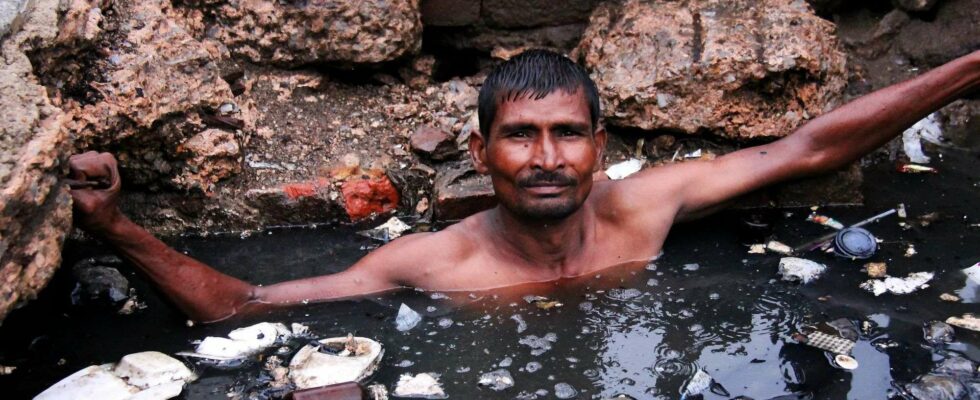Des travailleurs indiens effectuent des tâches périlleuses en nettoyant les fosses septiques et les égouts, souvent au péril de leur vie. Ces éboueurs, issus des milieux les plus pauvres, sont sous-payés, recevant seulement 3 £ par jour, et souffrent de problèmes de santé graves liés à leur travail, avec une espérance de vie d’environ 40 ans. Malgré l’illégalité de cette pratique, elle persiste, alimentée par un stigmate social fort à l’égard des Dalits. Des initiatives émergent, comme l’utilisation de robots pour remplacer ces travailleurs, mais le changement reste lent.
Workers engaged in what is deemed the world’s ‘most perilous occupation’ contend with snakes in excrement-filled tunnels, earning merely £3 a day.
Manual scavenging is an arduous and dismal job where sanitation laborers, often from India’s most impoverished backgrounds, are tasked with cleaning human waste from sewers.
Those who take on this desperate role frequently struggle with alcoholism, resulting in a life expectancy of just 40 years.
In regions of India lacking modern sewage systems, manual scavengers utilize basic equipment like buckets and wheelbarrows to collect waste.
Men venture into perilous ‘death pits,’ submerging themselves in sewage to cleanse tunnels and septic tanks.
Women are responsible for removing waste from dry latrines, carrying it on their heads in baskets before disposing of it in fields.
Many enter this trade at a mere age of 15 to support their families, with parents who may also be engaged in scavenging work.
However, the meager pay correlates with a lifelong struggle against poverty and societal stigma.
These workers lack protective gear, such as goggles, relying instead on their everyday footwear to work in hazardous conditions.
To cope with the deplorable odors, many resort to alcohol, often entering the death pits under the influence.
The job presents a grim mortality rate, with around 600 workers succumbing annually to lung cancer, alcoholism, tetanus, and carbon monoxide poisoning.
Some even lose their lives while cleaning inside septic tanks.
A significant number of these sanitation workers do not operate in legitimate sewage systems but instead maintain the rail networks.
The Indian railways, employing over a million people, are considered the world’s largest open sewer, which also hires thousands of manual scavengers.
However, there is hope for the future, as the Indian government begins to adopt robotic technology for sewer cleaning.
The Bandicoot robot is capable of removing blockages from manholes, thus eliminating the need for workers to enter the sewers.
Advocacy for Scavenger Rights
Despite being illegal, the practice of manual scavenging continues unchecked, with tens of thousands still employed in this role.
Dr. Vimal Kumar established the Movement for Scavenger Community (MSC) to advocate for the rights of those performing this hazardous work.
This charity offers educational spaces and leadership training, aiming to empower communities to rise out of their circumstances.
Dalits, members of India’s lowest caste, are often unable to afford healthcare and are frequently employed on temporary agreements.
This work reinforces a stigma surrounding the Dalit community in India.
Known as « untouchables, » they are often perceived by other classes as « illiterate, lazy, and unwilling to work,” according to Dr. Vimal.
He emphasizes, “Society thinks we’re destined to clean other people’s filth. We face discrimination in every sphere of our lives.
“We are not seen as capable of becoming shopkeepers or vegetable vendors due to our perceived uncleanliness. In Hindi, we are derogatorily called ‘rats.’”
From Humble Beginnings to Success
Recently, Dr. Vimal’s mother, who finance his education in exchange for maintaining their home’s sanitation, passed away from lung cancer.
“My mother simultaneously worked as a cleaner for a wealthy family.
She would clean their bathrooms and collect her children’s discarded books for me since we could not afford to buy any.
“She died on August 19 from lung cancer, which developed due to the dust she was exposed to in her job.”
Dr. Vimal experienced harsh bullying at school due to his mother’s occupation.
“I recall schoolmates taunting me, claiming my mother cleaned up after them, which deeply affected me.
I even had a teacher refer to me as ‘the sweeper’s son’ instead of using my name.”
Despite these challenges, Vimal completed high school, pursued both undergraduate and postgraduate degrees, and ultimately earned a Ph.D. in the United States.
Traduction en français
Les travailleurs engagés dans ce qui est considéré comme la ‘profession la plus périlleuse du monde’ affrontent des serpents dans des tunnels remplis d’excréments, gagnant seulement 3 £ par jour.
Le travail de nettoyeur manuel est une tâche difficile et
